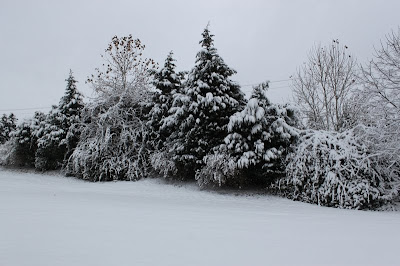I rarely see a great movie. Last night, I did.
It's called WINTER'S BONE. Directed by Debra Granik and based on the novel by Daniel Woodrell. The novel is unknown to me, but I'm going to find a copy to read it. And then I'm going to hunt for more work by the author. The film starred a young woman I'd never seen, Jennifer Lawrence, who was great, absolutely great.
 Jennifer Lawrence as Ree Dolly.
Jennifer Lawrence as Ree Dolly.
Here's one of the official online synopses that I found:
With an absent father and a withdrawn and depressed mother, 17 year-old Ree Dolly keeps her family together in a dirt poor rural area. She’s taken aback however when the local Sheriff tells her that her father put up their house as collateral for his bail and unless he shows up for his trial in a week’s time, they will lose it all.
She knows her father is involved in the local drug trade and manufactures crystal meth but anywhere she goes the message is the same: stay out of it and stop poking your nose in other people’s business. She refuses to listen, even after her father’s brother, Teardrop, tells her he’s probably been killed.
She pushes on, putting her own life in danger, for the sake of her family until the truth, or enough of it, is revealed.
That's the basic premise and true as far as it goes. But this movie was just an amazing representation of the poor rural people I knew for most of my childhood. Every actor in this movie was used to maximum effect by the director and cinematographer. You can see the hard life etched into each face--even youthful ones as relatively unscathed by time and experience as that of the hero of the tale, Ree Dolly. At only 17 she already appears worn and tired, if unscarred and unlined by the approaching wreck of life in the Ozarks hill country.

John Hawkes as "Teardrop", Ree's uncle and older brother of her missing father.
The movie, of course, is effective because it rings so true. The man who penned the tale lives in those Missouri ridges and valleys and knows the folk who exist there. And I can tell you the situations and the reactions of those humans are also true. They are little different from the folk among whom I lived in my own parts of the rural south, whether in the lowlands of the coastal plains or the mountains of Appalachia. Wherever you go and find poverty, these people are there.
One overriding image in the film was of the women of this community. The men are like poltergeists, waiting in the background and only there to inflict or to do violence. It's the women who stand as a buffer between authority and the men, between conflicts and their males, between these male gods and the mad world they have created.
If I've met a more effective hero than Ree Dolly in a work of fiction I don't recall this character. The story is a great one, told on a small scale, but a classic quest for all of the claustrophobia of the tiny, grimy, dangerous environs in which Ree is forced to journey.
One of the few moments of compassion that Ree experiences from a man during an attempt to enlist in the armed forces. Portrayed by Russell Schalk. I suspect that this guy is an actual Army recruiter because he surely made me believe it.
 The view outside our back door while the snow was still coming down the morning of December 26.
The view outside our back door while the snow was still coming down the morning of December 26. December 27, getting ready to leave for work. Sun just rising, celestial bodies still visible in the sky.
December 27, getting ready to leave for work. Sun just rising, celestial bodies still visible in the sky. The snow was already beginning to thin out, despite the cold. I think some of it was sublimating...just fading directly to gas.
The snow was already beginning to thin out, despite the cold. I think some of it was sublimating...just fading directly to gas. Pat, one of my supervisors, spreading salt over the ice so that we laborers don't bust our asses getting to our vehicles.
Pat, one of my supervisors, spreading salt over the ice so that we laborers don't bust our asses getting to our vehicles. Ward, one of my co-workers, taking some stuff to his vehicle, moving gingerly over a thin sheen of ice.
Ward, one of my co-workers, taking some stuff to his vehicle, moving gingerly over a thin sheen of ice.












































